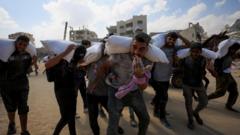Long-standing conflicts escalate as both Israel and Hamas face mounting accusations of inhumane actions in a war that has taken a dire toll on civilians.
Israel’s Allies Voice Concerns as War Crimes Allegations Mount in Gaza

Israel’s Allies Voice Concerns as War Crimes Allegations Mount in Gaza
Tensions soar as evidence of alleged war crimes in Gaza raises global alarm.
In the shadow of growing allegations, recent events have revealed a significant escalation in the Israel-Hamas conflict. The international community is increasingly vocal about the rising death toll and humanitarian crisis in Gaza, witnessing allegations of war crimes from various fronts. Prime Minister Benjamin Netanyahu initially dismissed Palestinian tensions, emphasizing threats from Iran, and aimed to foster ties with Saudi Arabia. Yet, as recent actions unfolded, including the lethal attack by Hamas on October 7, 2023, the situation spiraled into a significant conflict.
For nearly two years, this protracted struggle has claimed numerous lives, and the worsening conditions in Gaza signal another critical juncture. This conflict is not merely historical but remains rooted in a deep desire for territorial control between Jews and Arabs—a conflict that has devastated many. As the situation drew international attention, reporting has become challenging due to restrictions imposed by Israel on foreign journalists in Gaza, making it extremely difficult to establish the ground realities of the situation.
Notably, the brutality of the initial October Hamas charge shook many, resulting in over 1,200 Israeli casualties, primarily among civilians, alongside the hostage crisis that ensued. Conversely, evidence has surfaced suggesting a series of war crimes committed by Israeli forces, including the slow starvation of Gazan civilians, indiscriminately high civilian death tolls during military campaigns, and extensive destruction of towns that does not align with justifiable military strategies.
In a disturbing turn, Netanyahu along with his former defense minister faces war crimes warrants from the International Criminal Court. However, they maintain their claims of innocence vehemently. In addition, Israel's defensive stance against allegations of genocide from the International Court of Justice has been marked by accusations of antisemitism.
Israel's global allies, notably after the immediate shock of the Hamas attacks, are now beginning to voice their discontent with Türkiye’s actions in Gaza. The stakes are rising, and even previous strong supporters are now expressing frustration. The aid situation remains dire, with a recent statement from multiple nations condemning the Israeli approach to humanitarian assistance as failing and inhumane. They highlighted that the systems in place are causing fresh waves of suffering among the Gazan population.
The discussion regarding a potential ceasefire appears pertinent as both international and domestic pressures mount on the Israeli government. While Netanyahu currently evades a confidence vote, the payoffs of his decisions may dictate his political future in the coming months. With civilians trapped in the throes of war and hostages languishing in captivity, the prospect of a ceasefire provides a faint glimmer of hope amidst the shadows of death. While calls for diplomacy grow louder, the possibility of sustained peace remains uncertain as hostile actions continue to spiral.
For nearly two years, this protracted struggle has claimed numerous lives, and the worsening conditions in Gaza signal another critical juncture. This conflict is not merely historical but remains rooted in a deep desire for territorial control between Jews and Arabs—a conflict that has devastated many. As the situation drew international attention, reporting has become challenging due to restrictions imposed by Israel on foreign journalists in Gaza, making it extremely difficult to establish the ground realities of the situation.
Notably, the brutality of the initial October Hamas charge shook many, resulting in over 1,200 Israeli casualties, primarily among civilians, alongside the hostage crisis that ensued. Conversely, evidence has surfaced suggesting a series of war crimes committed by Israeli forces, including the slow starvation of Gazan civilians, indiscriminately high civilian death tolls during military campaigns, and extensive destruction of towns that does not align with justifiable military strategies.
In a disturbing turn, Netanyahu along with his former defense minister faces war crimes warrants from the International Criminal Court. However, they maintain their claims of innocence vehemently. In addition, Israel's defensive stance against allegations of genocide from the International Court of Justice has been marked by accusations of antisemitism.
Israel's global allies, notably after the immediate shock of the Hamas attacks, are now beginning to voice their discontent with Türkiye’s actions in Gaza. The stakes are rising, and even previous strong supporters are now expressing frustration. The aid situation remains dire, with a recent statement from multiple nations condemning the Israeli approach to humanitarian assistance as failing and inhumane. They highlighted that the systems in place are causing fresh waves of suffering among the Gazan population.
The discussion regarding a potential ceasefire appears pertinent as both international and domestic pressures mount on the Israeli government. While Netanyahu currently evades a confidence vote, the payoffs of his decisions may dictate his political future in the coming months. With civilians trapped in the throes of war and hostages languishing in captivity, the prospect of a ceasefire provides a faint glimmer of hope amidst the shadows of death. While calls for diplomacy grow louder, the possibility of sustained peace remains uncertain as hostile actions continue to spiral.



















